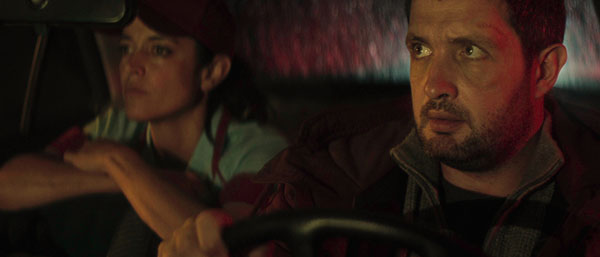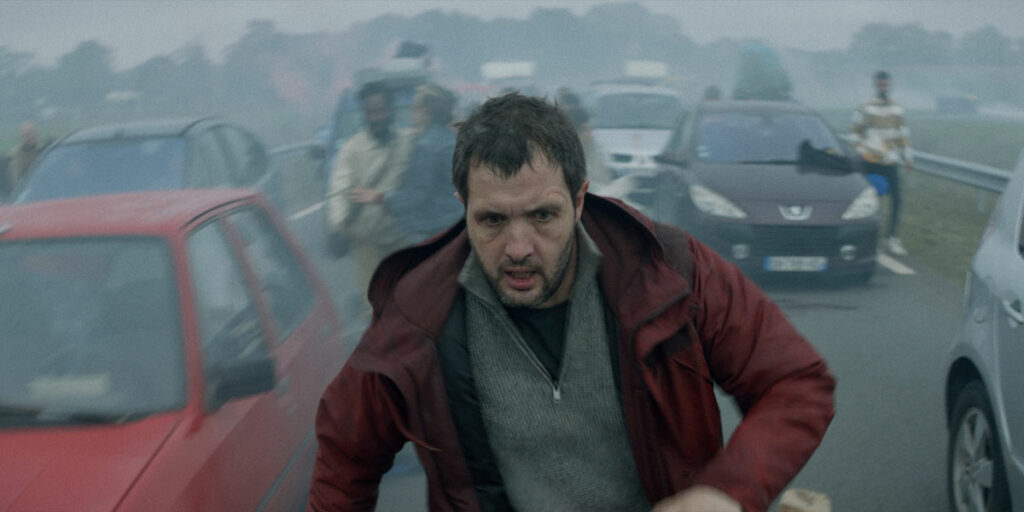While Vincent Must Die’s initial moments spark intrigue, its ideas feel better suited as a short film rather than a full-length feature.
Have you ever felt like the world was out to get you, as if everyone was against you for a particular reason which you don’t know about? You begin to think that everyone is watching every move you make. It is pretty startling, because you then turn a bit concerned with everything that is put in front of you, whether it is something challenging or a routine task. Your life is turned upside down: you worry about what to do next and if an escape is possible. This is the setup for Stéphan Castang’s latest feature, Vincent Must Die (Vincent Doit Mourir), where a man leaves his ordinary life behind because a weird anomaly has plagued him like a curse.
An electronic pumping score initiates the first steps of this fast-paced picture, where we see the titular character, Vincent (Karim Leklou), designing on his computer. For him, this is just a regular day at the job he slightly enjoys. Of course, Vincent would be happier working elsewhere, but at least he makes ends meet. A few hours later, Vincent and the company team meet to discuss their work’s progress; not much detail about their job is given here, but a critical remark paves the way for the film’s rapid violent turn. An intern walks into the room, and Vincent jokingly tells him to “get him a coffee”. The intern doesn’t respond well to the sarcastic joke, and after the meeting is over, he hits Vincent repeatedly with his laptop before the kerfuffle is broken.
The next day, something similar happens: Vincent’s co-worker Yves (Emmanuel Vérité) attacks him for no apparent reason, this time stabbing him repeatedly on the hand. After a few brutal seconds, they go to human resources and talk things through. Yves doesn’t know how to explain his actions against Vincent: it felt like he blacked out for a while, and his inner angst possessed him. They are asked if there was any tension beforehand, and both Yves and Vincent say no. “It’s not my usual state”, says Yves upon answering. Something weird is happening and it doesn’t seem to be slowing down, as Vincent is attacked by his neighbors, a homeless person, the postman, and random people he doesn’t even know – all with murderous intent.

Since the world is slowly collapsing right before him, Vincent departs his apartment complex to his father’s house. We don’t know much about this character, only that he’s a bit unhappy with his graphic designing job (of course, who isn’t?) and lonely, in desperate need of a partner. So, begin to question why Vincent has to die. Why does he have this condemnation on his back? Is he the only one suffering from this malice? These questions go through Vincent’s mind in this paranoia-inducing journey of societal horrors. The audience tries to put together all the pieces of the puzzle alongside Vincent, to discover the meaning behind all this. The film doesn’t provide easy answers; unfortunately, we don’t care for them by the time the third act arrives.
Although Vincent Must Die intrigues the audience during its fast-paced first act and violent scenarios, its central plot device feels better suited for a short film rather than a feature-length project. The main idea that the violence demonstrated on-screen is the accumulated inner angst in our society, fueled by our worries, fears, anxieties, amongst other things that bother their daily living. But, that specific concept Stéphan Castang wants to implement into his film (and screenplay) is easy to catch. After a couple of minutes of watching Vincent run for his life, trying to avoid contact with everybody as he doesn’t know who will turn on him, you get the idea. Violence is ever present in our society to the point where, for the most part, it feels as if nothing has happened.
Castang wants to talk about the indifference to violence and the ability to look away from it that plenty of people have just because they have a secure life. Meanwhile, the rest of us is almost living in an ever-burning hell of some sort. This is where the horror aspects in Vincent Must Die come from, not only taking inspiration from new-wave French horror movies but also nodding to American genre icons such as George A. Romero (particularly his influential 1973 film The Crazies) and John Carpenter, albeit with a more satirical undertone. The issue with his inclination toward the horror genre is that Castang does a lot of repetition, crafting similar scenes that don’t add to the film’s thesis and only serve as shock factor for its satire to cause some effect.
A film in need of some cuts can cause a person to feel frustrated, and surprisingly this one doesn’t. Nonetheless, it definitely feels as if it runs its course a while before the end credits arrive. It’s almost like a descent into madness, but a less interesting or note-worthy one. And it is disappointing, because you have great talent both in front and out of the camera, like the leading pairing of Karim Leklou and Vimala Pons and cinematographer Manuel Dacosse (Evolution, The Strange Color of Your Body’s Tears). While its violent punches do make you excited for the film’s next move, throughout its humorless satirical course, Vincent Must Die is just like its titular character, in the end: unremarkable.
Vincent Must Die premiered at the Cannes Film Festival on May 19, 2023, as part of the 62° Semaine de la Critique. Read all our Cannes Film Festival articles and our entire film festival coverage!

